| SHADOWS ON THE WALL | REVIEWS | NEWS | FESTIVAL | AWARDS | Q&A | ABOUT | TALKBACK | |||||
 Shadows off the beaten path Shadows off the beaten pathIndies, foreigns, docs and shorts...
On this page:
THE ACCOMPANIST |
THE DINNER PARTY |
TOMMASO
| |||||
| See also: SHADOWS FILM FESTIVAL | Last update 3.Jun.20 | |||||
|
The Accompanist Review by Rich Cline | 
| |||||
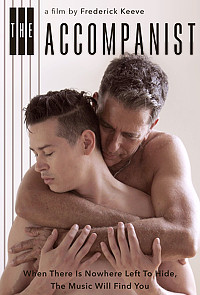 dir-scr Frederick Keeve prd Frederick Keeve, Julie Eagleton with Frederick Keeve, Ricky Palomino, Aaron Cavette, Christopher Pawl, Juliet Doherty, Jeanette Driver, Angelle Brooks, John J Todd, Moises Parra, Nader Hamad, Brian Falkner, Kelsey Ang release US 2.Jun.20 19/US 1h33 Watch it now... |
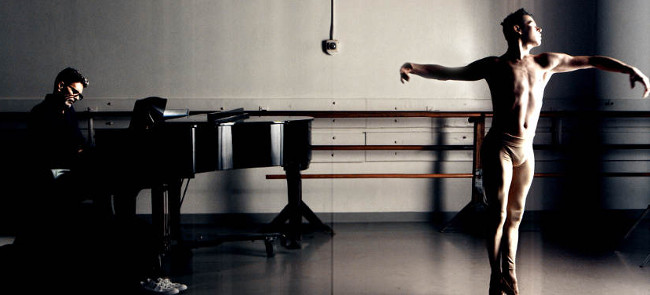 There's a simplicity to this odd drama that makes it intriguing, nicely using music and movement to offer insight into the characters. Actor-filmmaker Frederick Keeve directs in an unfussy documentary style, and the ambitious script has a nicely offhanded feel, even with its bizarre metaphysical touches and awkward plotting. While is feels very amateurish, the characters have charm and the story is complex enough to catch our interest. Grieving a loss, Jason (Keeve) turns to music to sooth himself. In middle-age, he works as an accompanist at a Los Angeles ballet studio, where dancer Brandon (Palomino) convinces him to help prepare for a big audition. But Jason believes bad things follow him, and is preoccupied with his wife (Driver) and two grown kids (Doherty and Pawl). He's also determined to help Brandon escape from his abusive relationship to the thuggish Adam (Cavette). And as they become closer, Jason and Brandon begin to fall in love. But both are damaged souls. While the unusual editing rhythms are slack and the sets eerily bare, there's a gentle authenticity to the characters that draws the audience into the story. The plot unfolds with strange flickers of imagination, hope and regret, although none of it is very clear, and the perspective shifts between Jason and Brandon to offer details about their lives that never quite come into focus. Along the way there are some shaky scenes that don't quite work, including some moments of contrived violence and emotion. Because of the observational filmmaking style, the actors all look a bit stilted, straining to convey their moodiness. Keeve has a nice presence but, even with crying jags and pained stares, he doesn't give away much about Jason's inner life as he sabotages his own feelings. Palomino is engaging as a troubled young guy who repeats mistakes, afraid his dream career is slipping away. The connection between these two wounded men is intriguing, played with some offbeat rhythms. At the centre of the story is Jason's belief that the music he is writing taps into some sort of energy force. So he feels responsible for an earthquake, for example, and also thinks he can cure someone's cancer. This never quite makes sense, but continues to impact the story in vague ways. The script also resists settling into either the romantic or parent-child strands, so the momentum begins to feel off-balance with random sequences and unfinished plot points. But the idea that healing comes through love, not violence, is a powerful one.
| ||||
|
The Dinner Party Review by Rich Cline | 
| |||||
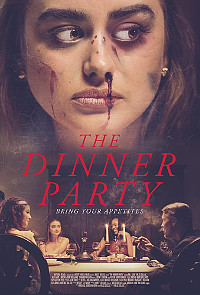 dir Miles Doleac scr Michael Donovan Horn, Miles Doleac prd Wesley C O'Mary, James V Bulian, Miles Doleac, Lindsay Anne Williams with Bill Sage, Miles Doleac, Alli Hart, Lindsay Anne Williams, Sawandi Wilson, Mike Mayhall, Kamille McCuin, Ritchie Montgomery, Rachel Ryals, Jeremy London, Sherri Eakin, Hollis Ellzey release US 5.Jun.20 20/US 1h55 Watch it now... |
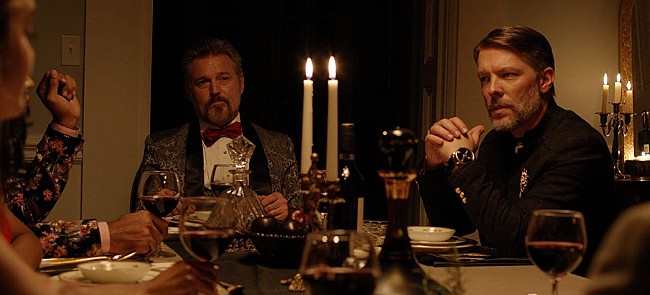 A snarky sense of humour pervades this horror movie, offering wry laughter along with buckets of gore. While budgetary issues are apparent, the film is nicely shot and edited, and the actors give riotously arch performances. This adds some jagged humour to the rather dense and impenetrable dialog. But as things get increasingly gruesome, climaxing in a cultish ceremony, the choppy editing makes it impossible to remain engaged. In their isolated mansion, Sebastian and Carmine (Wilson and Sage) are hosting a phone-free dinner party. The special guests are playwright Jeff (Mayall) and his wife Haley (Hart), who are hoping for a boost to get Jeff's new play to Broadway. The hosts' friends include investment expert Vincent (Doleac), who exudes posh arrogance, flowery earth mother Sadie (Williams) and seductive novelist Agatha (McCuin). There are games, music and lots of rambling storytelling. But even before dinner is served, the evening has already taken some seriously grisly turns. Right from the start, there are hints that this is a sadistic secret society, from Sebastian's freak-out pranks to Vincent carving symbols in his arms, with added conversations about charms, symbols and spells. Everything about the house is creepy due to shadowy lighting and Clifton Hyde's jarring score, plus things like Sadie telling Agatha, "We can't have you corrupting her just yet." By the film's midpoint, there's already been a beheading. And the nastiness is only getting started. The characters' vivid textures create some intrigue. Mayall is superb as the desperate, hapless Jeff, who warns Hart's watchful Haley that there will be "no crazy" tonight. Although she seems to be the least bonkers person at the table. Wilson has the scene-stealing role as a smirking jokester, and Sage and Doleac flex fatherly authority as they recount sinister stories. Meanwhile, Williams and McCuin flood the screen with feminine energy that oddly seems to have malevolent intent. But then each moment is loaded with intent. So it's strange that deeper themes remain out of reach, aside from one reference to the "untouchable elite" and the awkward mix of misogyny and female empowerment. Rambling speeches and anecdotes are delivered in such unnatural ways that they're impossible to follow, so they only drag the running time beyond the breaking point. The one salient, involving story (Haley recounting a horrific family tragedy) is interrupted by pointless flashback fragments. So in the end, the camp sensibility and indulgent filmmaking become merely tiresome.
| ||||
|
Tommaso Review by Rich Cline | 
| |||||
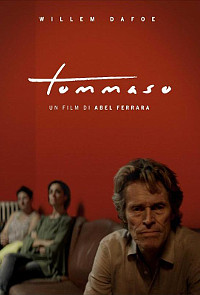 dir-scr Abel Ferrara prd Christos V Kostantakopoulos, Laura Buffoni, Michael Weber, Simone Gattoni with Willem Dafoe, Cristina Chiriac, Anna Ferrara, Maricla Amoriello, Luciano Sovena, Sofia Rania, Hassan Khan, Anastasia Balan, Dharma Mangia Woods, Alessandra Camilla Scarci, Stefano Papa, Claudia Palmira release It Nov.19 tff, US 5.Jun.20 19/Italy 1h58 CANNES FILM FEST Watch it now... |
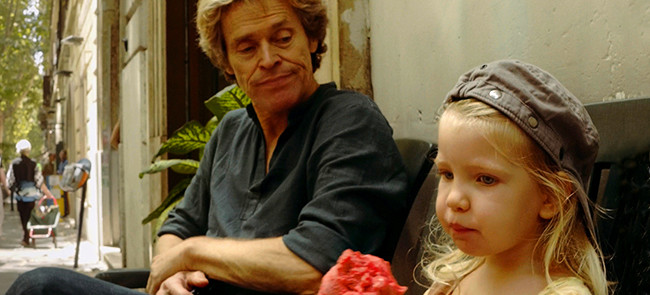 Shot with an earthy, fly-on-the-wall sensibility, this drama reunites Willem Dafoe with filmmaker Abel Ferrara for a film that's initially very different from Pasolini. This one begins with a light, playful tone that captures nuances in both relationships and a bustling multicultural society. This remarkable sense of intimacy continues as hints of darkness begin creeping in around the edges. It's seriously involving, even if we're sometimes afraid to look. An American in Rome, Tommaso (Dafoe) is studying Italian while struggling to support his young Eastern European wife Nikki (Chiriac) and their 3-year-old daughter DeeDee (Scarci). He's also trying to write a screenplay set in the Arctic, but is busy with cooking, childcare, teaching an acting class and attending a drug rehab group. Tommaso is feeling stressed by everything around him, worrying about Nikki's relaxed attitudes to life in a big city. So he's unable to stop picking fights with her. It certainly doesn't seem like the group therapy, meditation and yoga are helping. It's clear that Ferrara has woven autobiographical elements throughout the script, especially in intriguing flickers that touch on the creative process. Scenes feature a riot of languages and cultures, and there are also issues of age and gender at play, adding clever wrinkles to communication and interpersonal connections. Along the way, conversations reveal details about Tommaso, such as stories about working on film sets while on various drugs. And the surreal sequences might be dreams, delusions or flights of fancy. The acting matches the filmmaking style, with offhanded, realistic characters interacting on a variety of levels through relatively uneventful days. Dafoe brings an unnerving authenticity to Tommaso, a complex man scarred by his past and prone to letting his his mind wander far and wide. Each moment is seen through his eyes, and he remains recognisably real and also elusive. He's both creative and insecure, lashing out at anyone who crosses him while also following inappropriate urges. The odd rhythms of this film are fascinating, continually delving under the surface to reveal jarring thoughts and feelings. Although this is the specific mindset of a straight white man with a far-too-vivid imagination. So as the film delves deeper into Tommaso's mind, it becomes increasingly difficult to identify with him. And some of his actions make him impossible to like, especially in the heart-stopping final act. As a provocative portrait of a troubled man, the film is mesmerising. But it's a relief when it ends.
| ||||

See also: SHADOWS FILM FESTIVAL © 2020 by Rich Cline, Shadows
on the Wall
HOME | REVIEWS | NEWS | FESTIVAL | AWARDS
| Q&A | ABOUT | TALKBACK | | ||||

